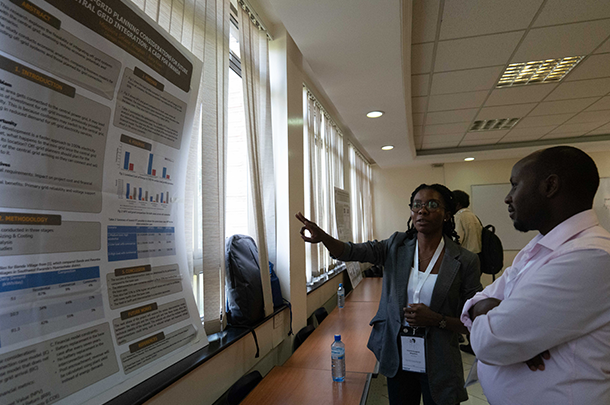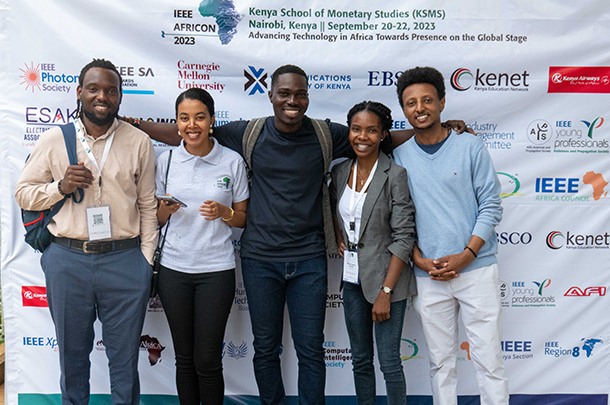Research opportunities enrich the student experience
Giordana Verrengia
Jan 10, 2024
An integral part of the student experience at Carnegie Mellon University Africa is the emphasis on research opportunities and important ripple effects like presenting at conferences, gaining recognition from peers, and networking with professionals whom students would like to work with after graduation.
The recent IEEE Africon Conference–which took place over three days in Nairobi, Kenya, back in September–represented one such chance for Carnegie Mellon students to present their research for contemplation and evaluation by an audience of technological experts, scholars, and entrepreneurs.

There is an important ripple effect from student research, such as presenting at conferences, gaining recognition from peers, and networking with professionals whom students would like to work with after graduation.
Nebiyou Daniel Hailemariam (MSIT '24)
Hailemariam hopes to use his educational background to help solve community problems around Africa, and he believes that research opportunities only make his master’s program more fruitful.
Hailemariam is on a research track within the information technology program, and he hopes to use these experiences to help him approach community problems around Africa. One such issue is a lack of weather stations across the continent. Limited workforce and high costs are some of the contributing factors, Hailemariam explains, so he has developed an innovative solution that uses machine learning and acoustic data.
"Our solution involves a convolutional neural network (CNN) regression model that analyzes audio recordings from Nigeria to estimate rainfall intensities. We designed this solution to be suitable for deployment on low-cost microcontrollers with limited memory and computation resources," says Hailemariam.
This project represented an opportunity to apply theoretical concepts to a real-world challenge, while the conference also facilitated a valuable exchange of ideas and feedback. Hailemariam noted that during the IEEE meeting, a professor advised his team of ways to expand their project for broader use across Africa, which they have taken into consideration.
Tunga Chamisso (MSIT '24)
As an information technology student, Tunga Tessema Chamisso presented a research paper that evaluated several strategies for preventing social engineering attacks (SEAs), which are fraudulent bids for personal data that target mobile banking customers. Tunga says the purpose of finding this information was to empower financial institutions to develop more effective fraud prevention tactics, which will only become more important as the mobile money market continues to grow.
Tunga says that having valuable research experience will boost her résumé should she apply for a Ph.D. program in the future. Attending the conference also provided anecdotal evidence that her research topic was practical–several people Tunga spoke with said they’d experienced SEAs firsthand and had even lost money. Tunga now feels inspired to take her research further.
"My interactions convinced me of the need to convert this research into a product: A messaging app that can automatically classify these fraud messages in multiple African languages."
Blessed Guda (MS EAI '24)
Blessed Guda is in his second year of the master's of engineering and artificial intelligence program. In collaboration with Ahmed Biyabani, an associate teaching professor at CMU-Africa, Blessed has sought to apply machine learning models in resource-constrained healthcare settings. Their research paper, "Multi-Disease Detection of Diabetes and Breast Cancer Using The Doctor Framework," was presented in November at the IEEE ICMEA conference in Nigeria. The project blends two of Blessed's interests–finding solutions that serve Africans while experimenting with applications of Artificial Intelligence (AI).
"Traditionally, machine learning models are designed for single-disease detection, requiring new models for each ailment and resulting in increased computational costs," Blessed says, adding that data about new diseases is released incrementally, so models must be able to learn with new data while not forgetting what was learned previously.
"Our project aimed to use a single model for multi-disease detection while learning on incremental data." In partnership with Gertrude hospitals in Kenya, Blessed and Biyabani applied the "Doctor Framework," which achieves the best of both worlds by detecting multiple diseases while considering new and prior information.
"Experiments with breast cancer and diabetes showcased improved model generalization, promising more efficient healthcare solutions for Africa by minimizing costs and preserving data privacy," says Blessed of progress thus far.

The IEEE Africon Conference took place over three days in Nairobi, Kenya in September.